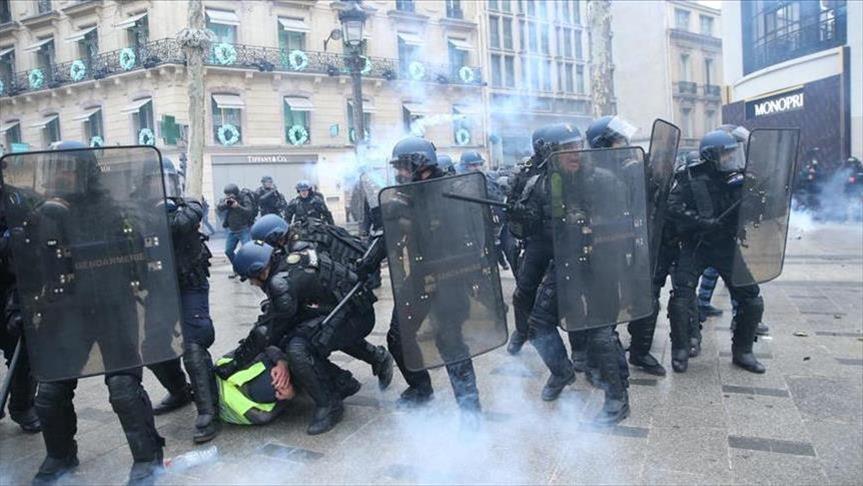Speaking in an interview with the website of the Strategic Council on Foreign Relations, Abolqasem Delfi referred to the violence used by the French police against protest rallies in the past months in that country and clarified: The situation in France since the second term of Macron’s presidency has been dramatically affected by the internal conditions of that country and the issue of the new law and the retirement age, because in this period, Macron is trying to implement one of his election promises to increase the retirement age.
While explaining the opposition of political parties and trade unions, including the left parties, especially the extreme left and the middle and right parties, as well as the government’s insistence on the necessity of raising the retirement age due to the economic conditions in Europe and France, he added: In the second term, the pressure against Macron has increased due to the loss of the parliamentary majority. Even now, the parties that have entrusted two rounds of elections to Macron are trying to prevent the government from reaching absolute power and, on the other hand, the result of its performance will not be a successful record, so his party and the nominated candidate of the party for the next elections could not be able to succeed quickly and create a glowing record for themselves.
The former Iranian ambassador in Paris said: During the first term of Macron’s presidency, we witnessed the weekly protests of the yellow vests against the increase in fuel prices, but in the second round, the majority of the French people voted for Macron despite those protests, and his government is now trying to fulfill its promises with the opportunity gained from winning the elections.
While explaining the process of approving the law on raising the retirement age in the French parliament and reaching its enforceability, Delfi continued: However, the pressure against implementing this law continues. The traditional political parties of France have almost gone to the sidelines during the two terms of Macron’s presidency, and the currents of modernization have entered the political scene, which is often associated with Macron’s party. Therefore, political parties are working in an unwritten coalition against Macron. On the other hand, the political-economic situation of Europe, and in particular France, has faced problems after the Ukraine war.
Referring to the unprecedented violence of the French police against the protesters in that country, he noted: The police must maintain security; but in France in the past three years, due to the continuation of protests and strikes against the government and the actions of the radical parties minority, the behavior of the police against demonstrations has gradually become more violent, and this violence in France is more protested by parties, people and domestic groups. Human rights institutions and international people’s organizations have also raised severe and frequent protests against those acts of violence.
The expert on international affairs pointed to France’s approach to changing police chiefs in the regions to reduce protests against police violence and added: Nevertheless, such violence has continued, up to the point that the Council of Europe has expressed concern over the type of the treatment of French police and warned that such treatments should be carried out within the framework of the law and the balanced capacity of the police and that the police should control the violence to prevent people from getting hurt. They have asked the French authorities to respect the right to protest and support the protesters and the journalists.
Delphi said the long duration of strikes and protests had played a role in the occurrence of violent and unreasonable actions by the French police and noted: This issue has caused social and economic damage to the French society; continuation of weekly demonstrations and strikes and their turn into violence has caused the police to resort to violence to ensure security, but police violence is not acceptable to any domestic or international authorities.
He emphasized: The increase in police violence creates other pressures on the country’s minister of the interior, the prime minister, and finally, the French government, and creates other political consequences. As we have seen recently, due to the type of police encounters and violence, political parties in the parliament are demanding the resignation of the prime minister and emphasizing that this government does not have the authority to run the country and cannot deal with problems; therefore, the prime minister should resign. In this case, the government will also change.
The former Iranian ambassador in France reminded: The violent treatment of the police in France with the protesters is not unprecedented, and we have witnessed various violent and severe conflicts between the police and their security forces in the past years, since 1960, when the crucial disturbances during the presidency of General “De Gaulle” happened until today, against the protesters and the people.
Delfi added: France’s role and image as a country claimant of human rights, freedom of speech, and democracy will be overshadowed during the violence, but nothing special will happen in France regarding the internal situation. Although the European Human Rights Council has condemned those acts of violence or France has agreed with the formation of the Commission of Inquiry, they are trying to justify themselves in this way. But the pressures are political pressures, and the political parties, in the situation where they could not influence the approval of this law, want the result of those pressures to affect the government and cause problems for the government, Macron, and his party so that their candidates would not have the opportunity to succeed in the forthcoming elections.
He said: Under such a situation, tarnishing France’s image or even issuing a resolution in Europe and condemning France is not very important for Macron. He must save himself from this situation to have the French people’s public opinion as his support to continue his policies and their accompany in the next presidential and parliamentary elections.










0 Comments